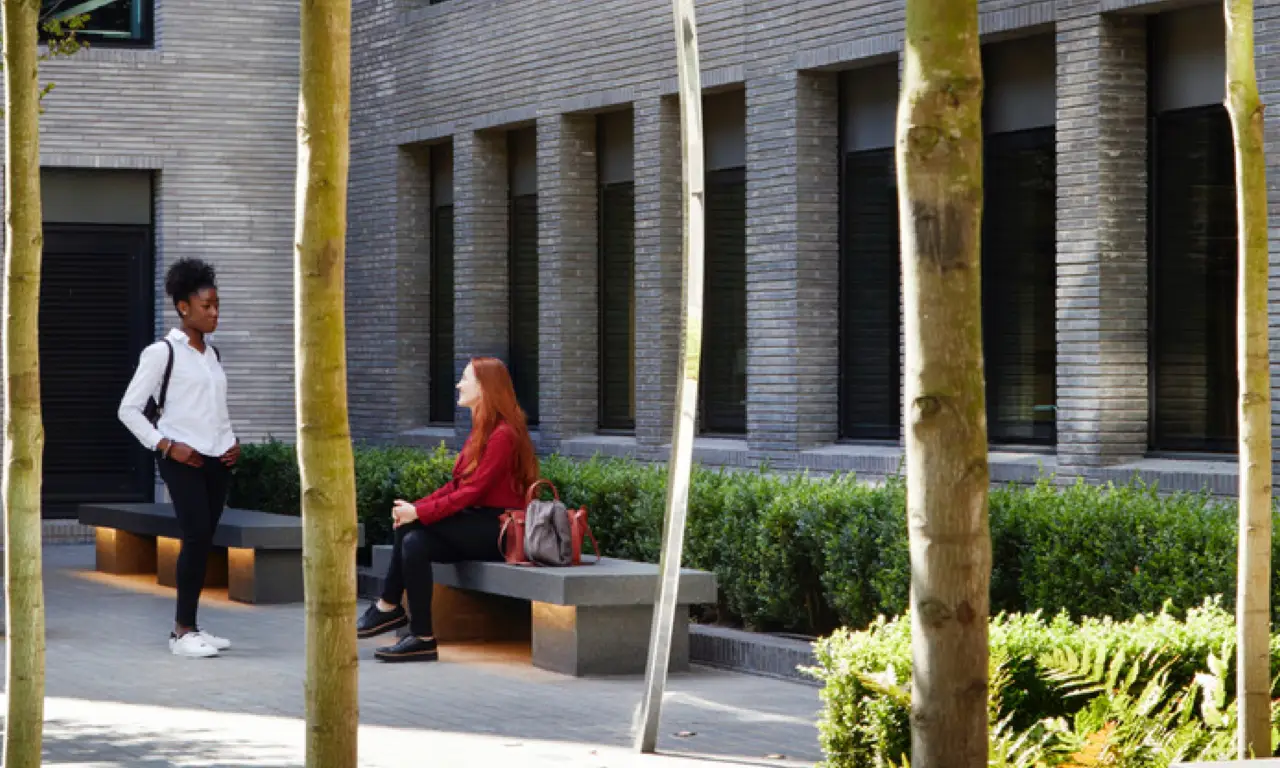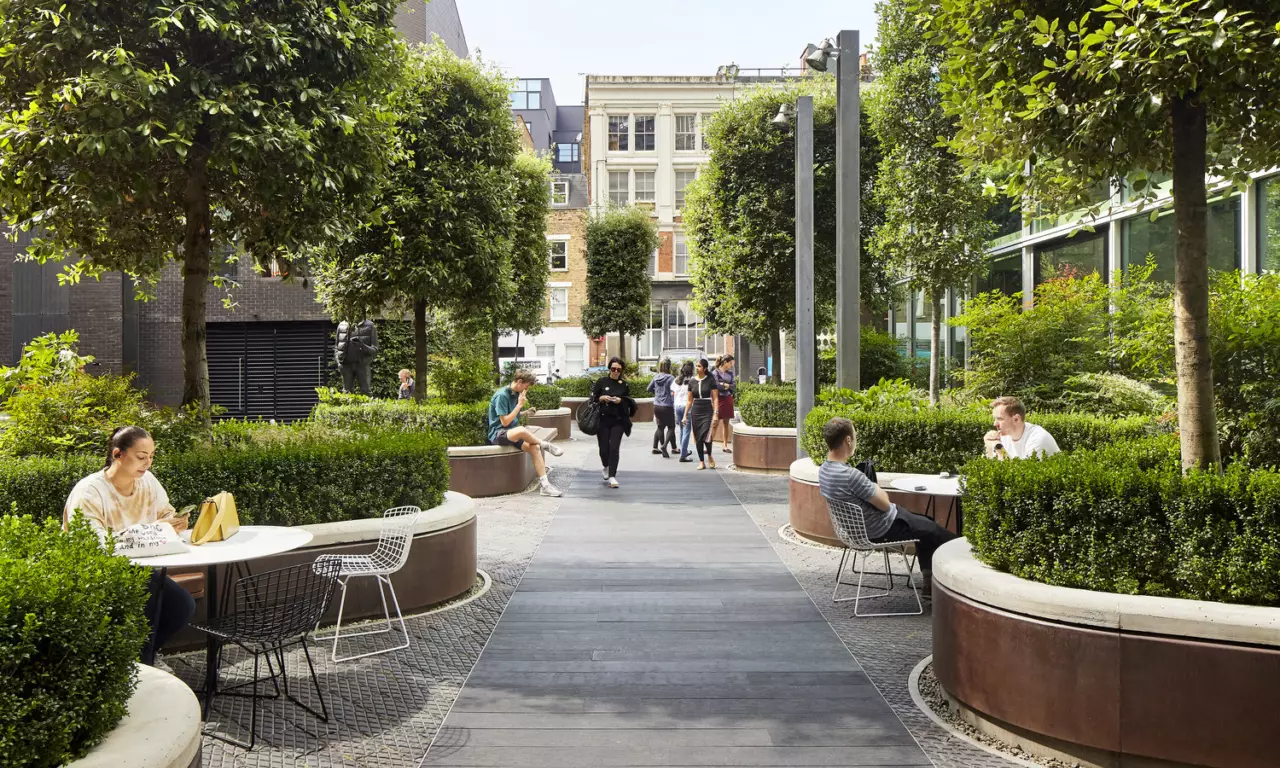Loose fit
2021 Responsibility Report
Environmental
Net
zero
carbon
In our first full year following our commitment to be net zero carbon (NZC) by 2030, we set building-specific energy targets aligned with a 1.5°C climate scenario, introduced embodied carbon targets for our new developments, and released our first net zero carbon survey to ramp up our NZC-focused engagement with our occupiers.
0%
Change in Scope 1-3 carbon emissions
While our absolute energy and water consumption has increased from last year, largely as a result of increased occupancy of our buildings, we have seen minimal change in our total carbon footprint. Landlord emissions alone, reduced by 3%. These minimal changes can be attributed to lower carbon factors and the start of our transition to all electric heating and cooling systems.
+1%
Energy
We saw a 1% increase in our absolute landlord and tenant energy consumption. With increased occupancy, we had anticipated this figure to increase more, but this was largely offset by the disposal of Angel Square EC1, 19-35 Baker Street W1 moving into the construction phase and continued building optimisation by our property management team.
+7%
Water
We saw a 7% increase in absolute water consumption (excluding retail) which closely follows increased occupancy of our buildings.
14%
All electric
Over 55,000 sq ft of floor space was converted to being all electric in 2021 and more than 70,000 sq ft is currently on site. Our total portfolio is now 14% all electric based on net internal area (NIA).
49%
Occupier engagement on net zero carbon
We undertook our first net zero carbon occupiers survey which, along with our first Stakeholder Day has helped us better understand our occupiers’ net zero journeys and how we can collaborate to reduce operational carbon. By the end of 2021 we had engaged with 49% of our occupiers (by ERV).
99%
EPC 2023 Compliance
Our portfolio is 99% compliant (by ERV) with 2023 EPC legislation and already 61% compliant with proposed 2030 legislation, which requires EPC ‘A’ or ‘B’. We have a fully costed plan of c.£97m to cover 2030 compliance, supported by third parties.
23%
Green gas
23% of total gas consumption is covered by a green tariff.
-28%
Energy intensity - SBTi
We reduced our energy intensity by 28% against our 2013 baseline science-based target (SBTi).
-55%
Carbon intensity - SBTi
We reduced our carbon intensity in our like-for-like portfolio by 55% against our 2013 baseline science-based target (SBTi).
Social
£105k
Community Fund
We committed £105k towards the Community Fund for 2021, supporting 19 projects. To date the fund has supported around 130 projects since inception with £850k of funding.
£620k
Sponsorships & donations
Additional community and sponsorship donations for 2021, including our provision of accommodation to NHS staff in Fitzrovia.
TOP 5%
NES position
Placed in top 5% of all companies achieving the National Equality Standard. Our Diversity & Inclusion working group established clear priorities and KPIs to help guide the business.
94%
Proud to work for Derwent London
Our latest staff survey revealed that 94% of staff said they are proud to work for us with 91% either satisfied or very satisfied to work for us.
18
Mental health champions
Staff Mental Health First Aid (MHFA) champions trained in supporting and signposting colleagues.
Governance
20
Payment days to suppliers
The Finance team worked hard to reduce our average payment term to 20 days, which assisted our contractors and suppliers with their cash flow and liquidity.
Low risk
Tax status
Our attitude towards tax risk is primarily governed by the Board’s objectives to retain our REIT status and maintain our ‘low-risk’ rating from HMRC. The Board was pleased to have received a ‘low-risk’ rating from HMRC which is valid until 2022.
7.5%
Executive Director bonus
7.5% of the Executive Directors’ annual bonus is dependent upon the achievement of climate-related targets. A further 2.5% is reliant on staff satisfaction.
143 hours
Compliance training hours undertaken by all staff
We continue to operate a mandatory training programme which aims to reinforce key compliance messages in areas such as anti-bribery, modern slavery, conflicts of interest etc. All staff (including our Directors) completed 143 hours of training during 2021, in aggregate.
Download At A Glance
ScrollA word from our Chief Executive “Derwent London takes a ‘long-life, loose-fit, low-carbon’ approach to its distinctive, design-led buildings.”
2021 was an important year for Derwent London. In addition to being the busiest period for investment activity since 2007, we continued to progress and extend our environmental, social and governance (ESG) agenda. All of which is making us stronger, more inclusive and more innovative.
Alongside further increasing our significant focus on the ‘E’ in ESG, our activity is broader, encompassing each of the three pillars. The ‘S’ in ESG is rightly gaining importance and we expect greater emphasis going forward. A particular highlight is the increased funding we made available during the pandemic through our long-standing Community Fund which helps us support those individuals and organisations most in need.
Derwent London takes a ‘long-life, loose-fit, low-carbon’ approach to its distinctive, design-led buildings. As occupiers become increasingly demanding and selective of their space we must strive to remain ahead of the curve. Whilst our portfolio has strong sustainability credentials, our approach reaches across the whole business, incorporating our financing. Including our new £350m green bond, we now have total green debt capacity of £650m.
As part of our net zero carbon programme, we progressed a number of key initiatives. These included the submission of a planning application for a new solar park on our Scottish land and exploring further opportunities for tree planting. We also participated at COP26 to bring greater focus on the actions required across the real estate industry to meet the climate crisis.
Our first Stakeholder Day held in September, together with the results from our net zero carbon occupier survey, identified several collaboration opportunities to reduce our collective impact. It was great to see our ambitions shared by so many of our occupiers and supply chain; the scope for future collaboration and sharing of best practice is exciting.
Energy Performance Certificates (EPCs) are an important part of the UK’s move towards being net zero carbon by 2050. Derwent London is already effectively compliant with the forthcoming 2023 requirements which will apply a minimum rating of ‘E’ to operable leases. Legislation is expected to change, with the minimum rating rising to ‘B’ by 2030. Including on-site projects, our portfolio is already 61% compliant which compares to JLL’s estimate that just 23% of London offices are ‘B’ or better. We commissioned a detailed external report which estimates it will cost c.£97m to uplift our EPC ‘C’ or below buildings to 2030 compliance, which is less than 2% of our current portfolio valuation.
The whole Derwent London team, along with our supply chain, is crucial if we are to meet our net zero carbon targets. We want to deliver high quality, sustainable spaces which positively impact their surrounding communities. To do this, we work with like-minded organisations that share our vision and ambition.
The health and wellbeing of our staff is paramount. In addition to the physical aspects – such as continuing to review our Covid-19 protocols – diversity and inclusion (D&I) was an area of particular focus in 2021 and we were delighted to achieve the National Equality Standard (NES) in December. Being ranked in the top 5% of NES-accredited companies was a great way to end the year, particularly for everyone who has worked to strengthen our D&I culture.
We conducted our fourth employee survey, the results of which were both very encouraging and consistent with previous surveys. Overall staff satisfaction levels remain high at 90.5% and nearly 90% of respondents ‘would recommend Derwent London as a great place to work’.
Finally, it would be remiss of me not to end with a word of thanks: to all of our team for seeing us through unprecedented times; to all of the occupiers working with us to reduce the carbon footprint of our portfolio; to the suppliers who are meeting our ESG standards and to all of the partners and stakeholders who continue to support our work – thank you.
Paul Williams
Chief Executive
ScrollDirection of travel “We are pressing on with our work to improve life in our communities, reducing our environmental impact and being transparent in our approach.”
Hello, and welcome to our 10th Responsibility Report – our annual review of Derwent London’s environmental, social and governance (ESG) work and this year presented for the first time in a full online format.
Just like 2020, 2021 was an extraordinary year. As lockdown restrictions eased in the spring, companies moved to a hybrid pattern of working, and occupiers made a cautious return to the office. It was a year of disruption, for our own business, our occupiers, stakeholders and suppliers, and for all our efforts to promote ESG across our activities.
It was never going to stop us though – least of all in our push towards becoming net zero carbon. After the big falls of 2020 due to lower occupancy, our 2021 energy consumption and carbon footprint held more or less steady. Midway through 2020 we launched our Net Zero Carbon Pathway, detailing our ambitions and actions to achieve net zero carbon by 2030. In the pathway’s first full year, we pressed ahead with our aims, stepping up plans for the electrification of our buildings, submitting a planning application for a solar park that could meet almost half of our managed portfolio’s electricity needs, and building stronger relationships with our occupiers so that we can support them in their own low-carbon ambitions.
Our first net zero carbon occupier survey, carried out in September, laid the foundations for future collaboration, establishing a dialogue that will enable us to share with our occupiers best practice and opportunities for setting targets as well as benchmark their performance.
Meanwhile, our study into technical feasibility and costs of upgrading the EPC ‘C’ or below-rated properties in our portfolio to a more energy-efficient ‘B’ rating or above by 2030 returned welcome news. None of our buildings or spaces present unsurmountable challenges, and we expect to have our entire portfolio at EPC B or better by 2030.
Further progress towards net zero carbon came with the strong support for our first green bond, which was listed on the London Stock Exchange in November. This saw us secure £350m of low-interest rate, long-term debt to help finance our net zero carbon development projects.
Covid-19 has not prevented us from playing our part in our communities, either. In Fitzrovia and the Tech Belt, we supported a raft of projects that promote social cohesion through our Community Fund, most of which were facing various challenges. We also continued our contributions to local and national organisations focused on mental health and homelessness.
We are pressing on with our work to improve life in our communities, reducing our environmental impact and being transparent in our approach. With eight years until 2030, we have work to do to reach net zero carbon. But with the sense of purpose that our pathway gives us, and the collaboration of our occupiers, suppliers and stakeholders, I know we will get there.
I hope you find our new report format useful, and it provides all the insights into our work that we always strive to give. If you would like to find out more or have any feedback, please drop us a line at sustainability@derwentlondon.com – thank you.
John Davies
Head of Sustainability
99% EPC compliance for 2023

Scottish solar park could provide 40% of our total electricity needs

REPORT
BROUGHT
TO YOU BY
Left to right:
John Davies
Helen Joscelyne
Samantha Carlsson
Herman Wa
Zanda Pipira
Susannah Woodgate

About Our Report
Its scope reflects our business activities – real estate investment, management and development in central London – which were unchanged during 2021. Our data boundaries, together with the calculation and aggregation methods are set out in our data methodology.
Our materiality matrix puts our seven key priorities into context against the issues material to our business.
The ability to interact with the material online as well as download data will, we hope, make it more accessible to our audiences and stakeholders, and elevate the communication of our ESG activity to a new, more responsive level.
Our review of our progress in supporting the UN Sustainable Development Goals (SDGs) can be found here. We have also set out our disclosures against the Task Force on Climate-related Financial Disclosures (TCFD) recommendations here.
As part of the review, a four-step process – identification, prioritisation, validation and review – was used to ensure the right issues are brought forward and assessed properly. The results from this exercise are examined by members of the Sustainability and Executive Committees to establish the priority and relative importance of the issues to both our business and stakeholders and ensure alignment with our Board’s risk tolerance. The material issues that affect our business remain unchanged from 2020.
Scope and boundaries
This report relates to the work undertaken in the past financial year which is also the calendar year – 1 January to 31 December 2021.
ReadIts scope reflects our business activities – real estate investment, management and development in central London – which were unchanged during 2021. Our data boundaries, together with the calculation and aggregation methods are set out in our data methodology.
Structure and materiality
Our report structure reflects our material ESG issues in the context of our day-to-day business activities.
ReadOur materiality matrix puts our seven key priorities into context against the issues material to our business.
Format
This year, for the first time, we have made the report fully digital.
ReadThe ability to interact with the material online as well as download data will, we hope, make it more accessible to our audiences and stakeholders, and elevate the communication of our ESG activity to a new, more responsive level.
Reporting frameworks
We compile and align our outputs with two reporting frameworks – GRI Standards and the EPRA Sustainability Best Practices Recommendations (sBPR) summaries of these can be found here (GRI) and here (EPRA).
Our review of our progress in supporting the UN Sustainable Development Goals (SDGs) can be found here. We have also set out our disclosures against the Task Force on Climate-related Financial Disclosures (TCFD) recommendations here.
Assurance
Our environmental, health and safety and green finance data is independently assured at the reasonable level by Deloitte LLP.
ReadMateriality
We continually review the broad spread of ESG based aspects relevant to our business to ensure they are captured effectively in our corporate strategy and net zero carbon ambitions.
ReadAs part of the review, a four-step process – identification, prioritisation, validation and review – was used to ensure the right issues are brought forward and assessed properly. The results from this exercise are examined by members of the Sustainability and Executive Committees to establish the priority and relative importance of the issues to both our business and stakeholders and ensure alignment with our Board’s risk tolerance. The material issues that affect our business remain unchanged from 2020.
Materiality Matrix
Explore our materiality matrix by clicking on one of the ESG issues
1
2
3
4
5
6
7
8
9




We support numerous charities and organisations working in our local areas. During the pandemic, our priority to support disadvantaged communities and individuals has never been more relevant.
Read MoreIn 2021, our annual fund of £100,000 was divided between 19 projects and, for the second year, provided some core funding to help keep some organisations up and running through the pandemic.
Read More
Community Fund 2021
£100,000+
19 Projects
130+ projects since 2013
Net Zero Carbon
We’ve set ourselves the goal to be operating at net zero carbon by 2030. Find out how we’re going to achieve it.
Read More
Download Our Data

